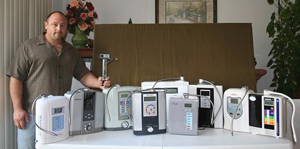August 23, 2010
One Bottled Water Alternative: Water Ionizers

By Michael D. Shaw
Bottled water, once as difficult to find as the most obscure and prized delicacy, is now available nearly everywhere. The familiar 24-packs of 500 milliliter bottles—and any number of other configurations—occupy significant shelf space at most grocery stores. This means that the product sells, and by virtue of its inherent profit is also worth the retail surface area.
No doubt, bottled water can be a lifesaver when deployed into areas hit by disaster, and it is unquestionably convenient. But, there is also a downside.
Recent statistics indicate that in the United States alone, 1.5 million barrels of oil are used annually in the production of the requisite bottles, with fewer than 20 percent of them being recycled. Then there’s the energy and environmental costs inherent to shipping the product long distances. Researcher Emily Arnold reminds us that…
Tap water comes to us through an energy-efficient infrastructure whereas bottled water must be transported long distances—and nearly one-fourth of it across national borders—by boat, train, airplane, and truck. This involves burning massive quantities of fossil fuels.
And, it must be said, bottled water can get expensive—often exceeding the cost of gasoline.
Fortunately, there are alternatives, including so-called water ionizers. These ionizers use the process of electrolysis to convert normal tap water, which is usually slightly acidic, to an alkaline state. Many ionizers also deliver the acidic water, recommended for certain functions, but generally not for drinking.
A number of health authorities warn against excessive acidity in the diet, and often point the finger at popular soft drinks that contain phosphoric acid as being contributory to decreasing bone density. It is noted, though, that well-designed studies provide completely opposite conclusions, and the jury is still out on long-term effects. One theory is that people who consume soft drinks—especially colas—in excess possibly have overall poorer nutrition.
The health benefits of alkaline water are controversial, replete with many claims that are lacking in detailed laboratory documentation. But, this is nothing new. Peer-reviewed double blind studies are extremely costly, and when not set against the backdrop of a regulated proprietary pharmaceutical drug are frankly just not worth it. Ultimately, people are drawn to alkaline water based on their own personal experiences with it.
As it happens, the consumer can choose between several water ionizers, at least one of which is sold via multi-level marketing (MLM).
Chanson Water Ionizers USA, based in Laguna Niguel, CA is not an MLM company, and provides plenty of technical information on the quality of water produced by its machines. In fact, it extensively tests the water produced by its own and competitive equipment for…
- Alkalinity level
- Acid level
- ORP (oxidation-reduction potential)
- Chlorine concentration
- Flow rate
- Taste
CEO Ronnie Ruiz, a veteran in the alternative health field, was fed up with the extravagant claims made by many water ionizer companies. He embarked on a search for the perfect partner, and found it in the Taiwan-based manufacturer Chanson Water Company, Ltd. In fact, Ruiz complied a checklist of qualities that he deemed essential, and they were all fulfilled by Chanson:
- Must be a true manufacturer and not a parts assembler
- Must have at least 10 years in the water ionizer field
- Must have excellent reputation in home country
- Must have at least 80% of its product line in the health category (shows financial motivations)
- Must have major focus and expertise in water filtration
- Layers of company names and identities cannot hide true manufacturers identity
It is hardly controversial to stress hydration, whatever the method. Indeed, the late “water cure” doctor F. Batmanghelidj, MD believed that the root cause of about 65% of health problems is dehydration. Even if that is an exaggeration, hydration has to be the cheapest cure ever proposed.

